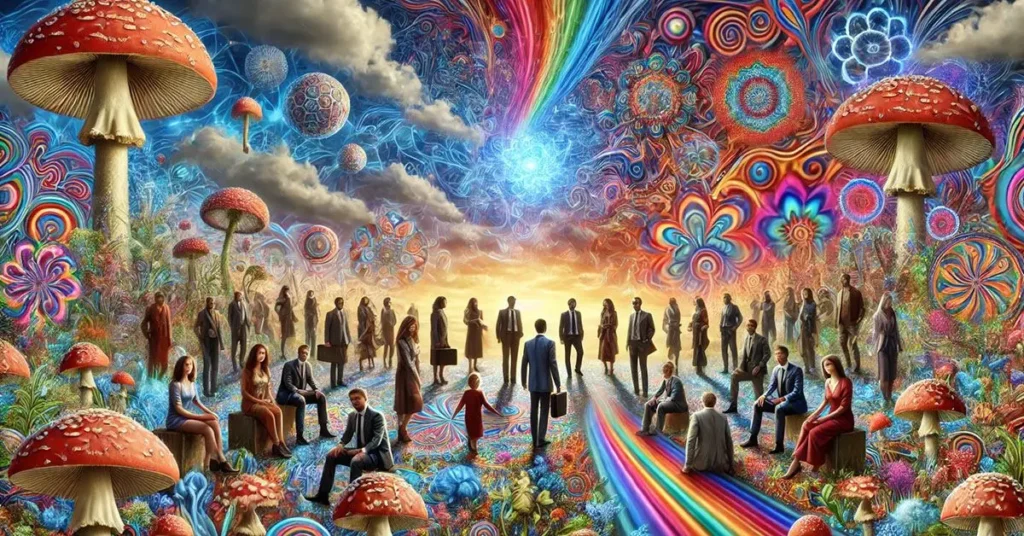The perception of psychedelic mushrooms has undergone a significant transformation in recent years. Once relegated to the fringes of society and closely associated with 1960s counterculture, psilocybin—the psychoactive component in these mushrooms—is now at the forefront of a major shift in mental health treatment and societal acceptance.
This shift is underscored by emerging research, changes in legal frameworks, and increasing public awareness, all contributing to the mainstream acceptance of these substances.
Historical Context and Recent Developments
Psychedelic mushrooms have been used for thousands of years, with evidence suggesting their use in religious and spiritual rituals as far back as 9000 B.C. in North African indigenous cultures. In the modern era, however, they became popular in the West in the 1950s when R. Gordon Wasson, a vice president at J.P. Morgan, published an article in Life magazine detailing his experiences with these mushrooms in Mexico.
The Controlled Substances Act of 1970 placed psilocybin among the most restricted drugs, categorizing it as a Schedule I substance, which is defined as a drug “with no currently accepted medical use and a high potential for abuse.” This classification significantly hindered research into its potential therapeutic benefits. However, recent years have seen a renaissance in research, with studies from leading institutions underscoring the potential mental health benefits of psilocybin.
Scientific Research and Health Benefits
Prominent studies have shown that psilocybin can produce significant and lasting reductions in depression and anxiety in patients suffering from life-threatening cancer diagnoses (Griffiths et al., 2016). Other studies have shown potential in treating depression, post-traumatic stress disorder (PTSD), and even addiction. A study from Johns Hopkins University in 2020 found that two doses of psilocybin produced rapid and large reductions in symptoms of depression in a small study of adults, with effects lasting up to four weeks after treatment (Davis et al., 2020).
Legal Landscape
The legal status of psilocybin is also evolving. As of 2021, cities like Denver, Oakland, and Santa Cruz have decriminalized the possession and use of psychedelic mushrooms, and Oregon has gone further by passing a ballot measure to legalize their therapeutic use under supervision (Oregon Health Authority, 2020). This change in the legal landscape is a significant indicator of shifting perceptions, making way for more comprehensive studies and, potentially, medical use.
Public Perception and Media Influence
Media portrayal of psychedelic mushrooms has shifted from focusing on their risks to exploring their potential therapeutic benefits. Documentaries and news reports on major networks have discussed the scientific findings in a positive light, helping to normalize the conversation around psychedelics.
Challenges and Concerns
Despite the positive trends, there are still significant challenges and concerns associated with the mainstream acceptance of psychedelic mushrooms. The most pressing is the need for comprehensive education about their safe use. There is also a potential risk of misuse and the need for proper regulatory frameworks to ensure that these substances are used safely and effectively, particularly outside of supervised medical settings.
Conclusion
The trajectory toward the mainstream acceptance of psychedelic mushrooms appears promising but requires cautious and well-regulated approaches to realize their potential benefits while mitigating risks fully. As research continues to evolve and legal barriers diminish, the role of psilocybin in therapeutic settings is poised to grow, potentially offering new avenues for treating some of today’s most challenging mental health issues.
Additional Sources:
1. Griffiths, R.R., Johnson, M.W., Carducci, M.A., Umbricht, A., Richards, W.A., Richards, B.D., Cosimano, M.P., & Klinedinst, M.A. (2016). Psilocybin produces substantial and sustained decreases in depression and anxiety in patients with life-threatening cancer: A randomized double-blind trial. Journal of Psychopharmacology, 30(12), 1181-1197.
2. Davis, A.K., Barrett, F.S., May, D.G., Cosimano, M.P., Sepeda, N.D., Johnson, M.W., Finan, P.H., & Griffiths, R.R. (2020). Effects of psilocybin-assisted therapy on major depressive disorder: A randomized clinical trial. JAMA Psychiatry, 78(5), 481-489.
3. Oregon Health Authority. (2020). Psilocybin Services Section.4. Winkelman, M. (2019). Psychedelics in American Religious Experience. Retrieved from an educational institution repository.
This article represents an amalgam of researched facts and emerging trends supported by recent studies and legislative changes, providing a comprehensive overview of the journey of psychedelic mushrooms from the fringes to mainstream consideration.

